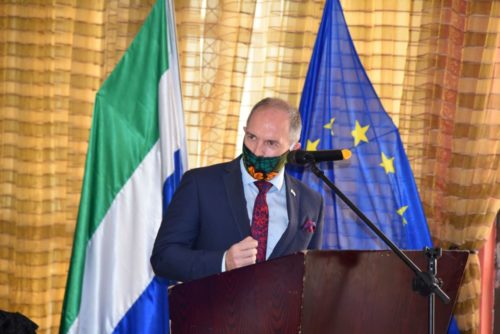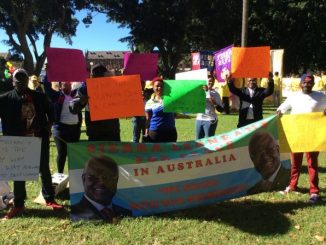
President Maada Bio has received a veritable slap in the face. As his government blocks official audit of funds received for the Covid-19 pandemic, the European Union Ambassador to Sierra Leone,Mr Tom Vens, has made a public statement calling on the government to be accountable and transparent with donor funds.
___________________________________________-
I am delighted to join you for the inaugural high-level dialogue between Government and Civil Society. Today’s event translates into action the commitment made by you, Mr President, to enhance consultation of and collaboration with Civil Society Organisations in addressing the crisis engendered by the COVID-19 and on broader governance and developmental issues.

It takes leadership to rethink and take affirmative action to reinvigorate the state-society social contract. Even more so during difficult times.
Your excellency, Fostering economic development and strengthening peace and democratic rule is not only your priority but has been the principal aim of the European Union from its very outset 70 years ago. As a community of like-minded States, the EU promotes the pursuit of peace and democracy both internally and in all its external actions, political and diplomatic relations with the rest of the world.
There is no one democratic model that fits all. The model as such is not the point – the participation in decision-making is; the opportunity for the citizens to take and be part in the governing of society; the opportunity to voice opinions through channels that do not undermine stability and the very foundation and principles of the state; that is what matters. And this is where civil society can play an often underestimated role.
I have no hesitation to state that strengthening the role of national civil society organisations in democratic processes, and promoting social accountability models based on transparency and sustained trust-building dialogue between State and non-State Institutions have always been at the core of the EU engagement with its partner countries.
The prospect of a global economic recession and social instability has driven the EU to widen and intensify its efforts. In Sierra Leone, as elsewhere in the world, we have front-loaded our budget support, repurposed our cooperation programmes, committed all available funds to support Government’s efforts to contain the pandemic and ensure prompt economic recovery.
And along with that, we have reinforced, widened and deepened our partnership with civil society organisations to become an effective force not just in the fight against COVID19 but for deepening democracy, social cohesion and public accountability.
Your Excellency, Honourable Ministers, Esteemed colleagues, we all agree – enhanced public participation, through active involvement of civil society organisations in public policy planning, implementation and oversight can significantly accrue the benefits and potential for development as well as peace and social cohesion. This is even more so in the COVID-19 context, and for a number of reasons:
Firstly, the speed and magnitude of the global crisis, with one-third of the global population under lockdown mean that we are entering unchartered territory. These have led to a new vision for action revolving around the concept of ‘resilient societies’ based on the mutually reinforcing pillars of peace and democracy and enhanced social accountability through the active engagement of civil society.
It became evident to what extent a vibrant and digitally-enabled civil society can be a crucial asset for disseminating vital information and ensuring public accountability.
Several examples attest to the positive role of CSOs in helping shape and implement Government response to the pandemic, ensure that this addresses the needs of the most vulnerable segments of society.
In Sierra Leone as elsewhere in the world, CSOs have proven critical in supporting the good implementation of COVID-19 support packages, facilitating outreach to potential beneficiaries.
Secondly, the amount of financial resources mobilised and the extraordinary measures adopted to respond to the crisis raise expectations, challenges and risks which call for heightened standards of transparency and accountability.
Public accountability has always been critical. But now even more.
Not just as an essential element of the social contract between state & society but also in the broader framework of the partnership with the international community.
Citizens’ quest and expectations for effective and efficient implementation and tangible outcomes are high, with no space for politically motivated distortions or the pursuit of narrow personal interests by those with a say in the allocation of resources. The call for sound financial management, fiscal transparency and public accountability by development partners is also strong. This is notably the case for those – like the European Union – providing direct budgetary aid to partner countries.
Esteemed representatives of the Civil Society, the challenges and expectations are high – but so is the potential to make a meaningful contribution. Civil Society can make COVID-19 response more effective, just and transparent.
It is our expectation the Civil Society Organizations will continue to help tracking and monitoring the implementation of measures, ensuring they target and reach the most vulnerable segment of society, providing Government and Development Partners the much-needed input on possible corrective actions.
Sierra Leone, like many countries in the world, has adopted extraordinary measures to respond to the crisis. Of all interventions two mechanisms call for particular attention: the national flagship cash-transfer programme and the Covid-19 extra-budgetary fund.
An extra-budgetary fund dedicated to COVID 19 has been established in view to overcome complex processes and delays and streamline the budgetary response to the crisis.
While the exceptional situation justified the creation of COVID-19 Emergency Funds, lessons learnt from the past and from elsewhere in the world indicate how they can also create significant vulnerabilities. Extra Budgetary Funds can fragment policymaking and implementation and cloud citizens’ understanding and trust of government operations, as they are often regarded as potential sources of financial malpractice and corruption.
It is against this background that I welcome and encourage all efforts aimed at heightened standards of transparency and social accountability, with a potent role for CSOs to endeavour to contribute collaboratively to oversight mechanisms.
Your Excellency, I know we can trust your leadership to excel in this respect.
The secondment of staff by the Auditor General in Sierra Leone to facilitate an interim audit of the special fund was quoted by the IMF as a global best practice. Such effort must be recognised, praised and pursued, and additional oversight mechanisms can be considered to enhance public accountability of crisis-related spending.
These can include (as it has been done in Togo or Honduras) dedicated portals to publish information on the execution of COVID-19 related expenditure and updates on payments made by the flagship social transfer program; or the establishment of hot-lines and grievance mechanisms for citizens to voice their questions and concerns over the distribution of relief packages.
Civil Society organisations – along with the Supreme Audit Institution and the Public Accounts Committee of Parliament – can be a powerful catalyst for enhancing the accountability of COVID-19 related spending.
Going forward, echoing the recommendations issued by the IMF and the Global Initiative for Fiscal Transparency, I wish to call upon CSOs and the National Authorities – notably the ministry of finance – to agree on practical steps to improve the transparency and accountability of COVID-19 related spending programs and tax measures. These can include i) enhanced reporting on emergency spending, stimulus plans and revenue sources and their impact on the economy and social development, ii) transparency over the beneficiaries of these measures and iii) disclosing information on procurement tenders and contracts.
Here is an opportunity to create new transparency and accountability tools that will build citizens trust and confidence in Government action and yield benefits way beyond the lifetime of the current crisis.
But I want to end on a more general note: in the past months, I have followed how your government’s decentralisation policy has been shaped. A few weeks back, representatives from civil society were given an opportunity to comment on the draft policy and to engage on the same. This opportunity was embraced with the right attitude and has provided inputs that allowed for a stronger and better articulated policy. It is a clear example how this engagement with civil society can be and should be a force for good.
In the same vain, Mr President, I wish to finish by paraphrasing what you said when on Wednesday you signed the repeal of criminal libel provisions in the Public Order Act: You said “We can be united to do the right thing.” Mr President, I dare add that to do the right thing, you have to be united. The opportunities are there to seize. You are blessed with a vibrant civil society that stands ready to support you in this. And in doing so, you can be assured of our unfettered support. Thank you!”



